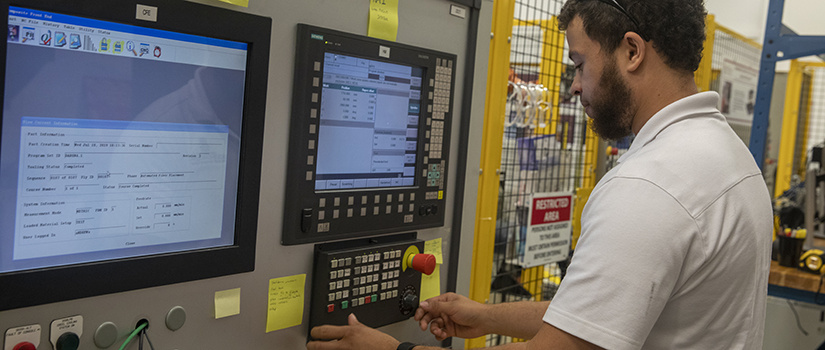Why Mechanical Engineering Graduate Study?
The graduate program in mechanical engineering at USC provides graduate students with opportunities to acquire a broad foundation of mechanical engineering knowledge, an in-depth research experience at the frontiers of mechanical engineering and skills for life-long learning and professional development. Our program is ranked #31 nationally, #7 in the Southern Region, and #1 in South Carolina by the National Research Council.
Programs of Study
Mechanical engineering graduate degrees include the Master of Engineering (M.E.), which is perceived to be more practically oriented and the Master of Science (M.S.), which is considered more scholarly or fundamental and includes a thesis. The Doctor of Philosophy (Ph.D.) focuses on research. The Ph.D. is essential for mechanical engineering faculty positions in higher education, as well as for some research and development occupations in industry and government laboratories.
Students pursuing M.S. M.E. and Ph.D. in mechanical engineering selects courses from four tracks of specialization to satisfy the program of study. In consultation with their academic advisor the students select and pursue the specialization track from the following:
- Engineering Mechanics
- Energy Systems
- Dynamics and Control
- Manufacturing
- Nuclear Engineering
The academic advisors guide the students in developing their program of study. Students, depending on their specific track of specialization, are required to successfully complete certain/specific courses to satisfy the requirements.
Visit Graduate Handbooks and Curricula for additional detail.
If your aim is a career in academia or in an industrial or government research and development laboratory, you'll need to earn the highest degree a mechanical engineer can get. Complete a research-based dissertation, grounded in coursework, in just four years beyond your B.S. degree.
Major components of the mechanical engineering Ph.D. program include:
- Research resulting in a dissertation proposal, a dissertation, a dissertation defense, and 12 hours of dissertation credit
- Qualifying and Comprehensive exams
- 48 credit hours of graduate-level coursework in and related to mechanical engineering and including the core course requirements.
- Up to 30 of the total credit hours may be transferred from a previously completed master’s degree
Mechanical Engineering Ph.D students develop a deep understanding in the advancing field of mechanical engineering and gain the ability to apply that understanding to solve a variety of mechanical engineering problems. In this program, you will execute a research plan, generate and analyze original results, and communicate those results through oral presentations and written publications.
Demonstrate your technical acumen and ratchet up your career objectives. This research-oriented graduate degree requires a thesis and 24 hours of graduate coursework.
Major components of the Mechanical Engineering M.S. program include:
- Research resulting in a thesis, thesis defense, and 6 hours of thesis credit
- A comprehensive exam
- A total of 24 credit-hours of graduate-level coursework in or related to mechanical engineering
- Not fewer than 12 credit hours taken at the 700-level or above
Graduates of the Mechanical Engineering M.S. program have the skills needed for life-long learning and professional development.
Become a more-competent engineer with just 30 hours of graduate course work beyond your B.S. This non-thesis graduate degree is especially great for working engineers who cannot easily access a research laboratory.
Major components of the Mechanical Engineering M.E. program include:
- A comprehensive exam
- 30 credit-hours of graduate-level coursework in or related to mechanical engineering
- Not fewer than 15 credit hours taken at the 700-level or above
The M.E. in Mechanical Engineering degree will prepare you total tackle difficult projects and to develop designs, solve problems and make impactful decisions.
Areas of Specialization
Mechanical Engineering graduate students work side by side with our faculty in state-of-the art labs and research centers that are breaking ground in many fields of mechanical engineering.
Fields of specialization include:
- Advanced Materials and Multi-scale Manufacturing
- Aerospace Engineering
- Mechanics and Multiphysics
- Thermo-Fluids Engineering
- Energy and Fuel Cells
- Biomedical Engineering
- Nuclear Engineering
- Nondestructive Evaluation
- Smart Structures and Condition Based Maintenance
- Mechatronics
- Nanotechnology
Visit the Department of Mechanical Engineering for more information on our faculty and research areas
Graduate Admissions
All applications must be submitted to the Graduate School of the University of South Carolina. The Graduate School provides helpful information on the admissions application process and even lets you know what to do before you apply.
Admission to mechanical engineering graduate programs is competitive. Admission decisions are based on the quality of the applicant's previous university-level academic work, letters of recommendation, GRE scores, and other evidence of past accomplishments. GRE General Test scores are required for all applicants applying for a research-based degree program (Ph.D. or M.S.), must be submitted by all applicants seeking assistantships and/or tuition support, and are recommended for all other applicants.
Test Scores:
Minimum scores are generally a GRE-V of 150 and a GRE-Q of 155. Students whose native language is not English must submit a satisfactory score on an English proficiency test. The Accepted English proficiency tests include the TOEFL exam (minimum score of 80 on the internet-based test), IELTS International Academic Course Type 2 exam (minimum score of 6.5) and the PTE Academic (minimum score of 53).
